How to Run Your First Dungeons and Dragons Game as a New Dungeon Master
Hey there! This website does contain affiliate links. If you purchase something through this page, Cats and Dice may earn a share of sales from the link. Learn more.
So you want to run your first Dungeons and Dragons game?
That’s great!
Dungeons and Dragons is more popular than ever, and many people are looking for a way to jump in for the first time. And there’s no better way to do that than to run your very own game.
It can be hard to know where to start, though. I wanted to play Dungeons and Dragons for years, but every time I tried to learn how to run a game, I found a bunch of advice on how to write your own game. It was great advice, but it wasn’t the advice I needed.
What I needed to know was how to run a game for the very first time. How do you run a Dungeons and Dragons game when you’ve only played a few times, or never? What does it mean to be a Dungeon Master, or a DM, for new players when you are also new?
That’s what we’ll talk about today.
Setting Up Your First Dungeons and Dragons Game as a DM
The long-term success of any Dungeons and Dragons game for new and experienced players alike comes from laying the right groundwork. There are three important steps to laying the groundwork.
- Finding like-minded players
- Choosing the right module
- Having a Session 0
If you take these three steps seriously, then you’ll be on your way to running a great D&D game as a first time DM.
Finding Like-Minded Players
There is absolutely nothing wrong with gathering a bunch of friends who also want to play D&D and just going from there. However, many DMs and players sometimes find that this isn’t the best way to find D&D players. Why? Because your friends may have wildly different expectations for the game, or they might have horribly conflicting schedules.
We’ll get into this more with a Session 0, but there are some questions you can ask potential players before you invite them to one session. For example, here is one simple question I encourage you to ask all potential players.
Why do you want to play D&D?
This simple question will give you a sense of two very important things: what module to choose and how committed that player is likely to be. Let’s say then you get these three answers.
I want to fight and kill a bunch of stuff!
I love fantasy stories and want to pretend I’m in Lord of the Rings.
My friend wanted to play, so I’m doing it to support them.
Now, there is no wrong answer to why someone wants to play D&D. These are wildly different answers, though. Player #1 would want a game with a lot of combat, maybe dungeon crawl heavy, and might even enjoy player vs player. Player #2 seems to want a more traditional game that’s more narrative-focused. And Player #3 will only be as committed as their friend.
As a Dungeon Master, it’s important to decide why you want to play first and what kind of game you want to run (generally speaking). That will help you find the right players for the game. This is especially important if you have played before and are simply new to DMing.
If you are brand new to Dungeons and Dragons as a whole and your players are, too, these conflicts might be slightly less likely to arise since no one has any expectations yet. It’s still worth noting that players can go certain directions very quickly, though.
Choosing the Right Module
Once you have a sense of what kind of game you want to run and what kind of game your players want to run, you’re ready to choose a module. As a new player and DM, this was tricky for me at first. I did not know where to look. Fortunately, there are now some great beginner Dungeon Master resources out there for your first Dungeons and Dragons game.
I began with the Starter Set, which is awesome for new players and DMs alike. It comes with premade characters, a set of dice, and a beginner-friendly module. The module starts by explaining many things to the DM about how to run the game, and then it switches from tutorial mode to normal mode gradually as the game goes along.
The Essentials Kit is a great option as well. This game comes with a few more dice and takes players through Level 6 rather than Level 5 like the Starter Set.
These are great because tabletop RPGs don’t look like other games. They’re so open-ended that it’s hard to know what to do with them at first. But the Starter Set does a good job of reminding new Dungeon Masters of one simple truth: everyone at the table is telling a collective story, but only the DM knows the major plot points. If you remember that, it will be easier to know what information to give and when you need to give it.
There are official modules you can run, too, like Curse of Strahd, but they might not be the best fit for a new Dungeon Master or players. Instead, another great option is DMsGuild.com. There you can find all sorts of great games for new players and DMs.
The other reason I love using Dungeon Master’s Guild is for one-shots. One-shots are games that are run in a single sitting that lasts anywhere from 2-6 hours (averaging 3-4). These contrast a campaign, which requires multiple sessions to play through.
As a first time DM, I ran this great Level 1 game from DMs Guild. It was easy to read and follow, referenced the beginning resources to get me familiar with them, but it also had a unique feel that showed me how variable Dungeons and Dragons can be.
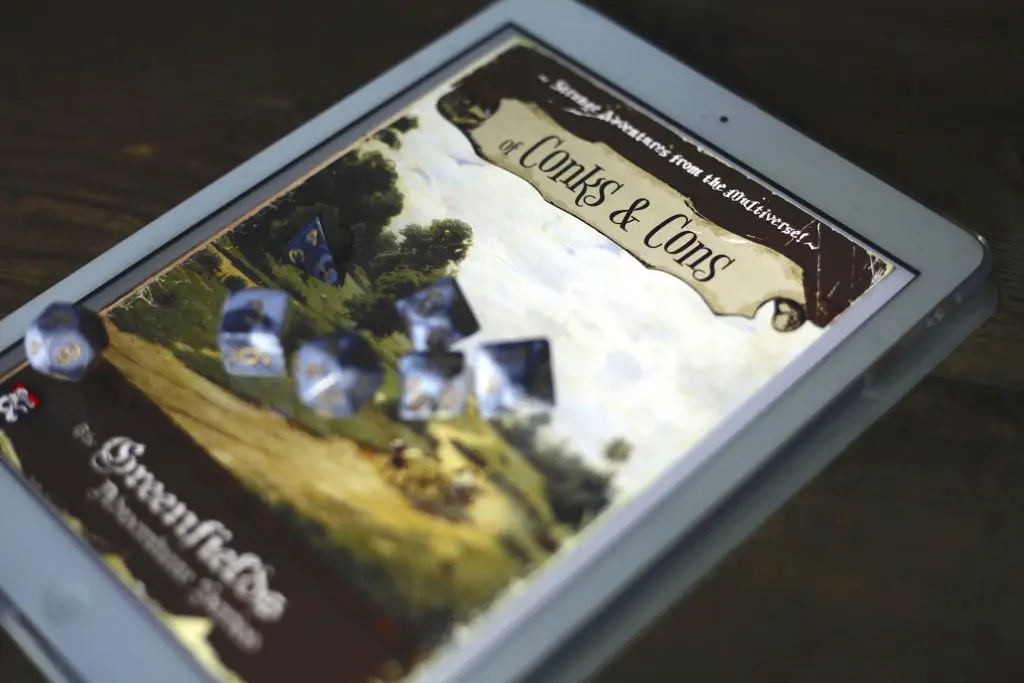
Having a Session 0
First, what is a Session 0? This is the first time where the DM and the players get together before they actually start playing the game. The Dungeon Master will tell them what module they will run, what general elements it will involve (e.g. dungeon crawl, puzzles, intrigue, etc.), and lay out some rules for the game. It’s very important for your first Dungeons and Dragons game.
This is also a great time to lay out a standard schedule. The one issue that derails RPG games more than anything else is inconsistent players or play. At a bare minimum, I recommend establishing a regular day, time, and frequency. You can also read more scheduling tips here.
The players, in turn, will make their characters. If you are using the Essentials Kit or something similar, then the players will choose their characters. It’s also a good time to go through the Basic Rules or the Player’s Handbook to make sure everyone is on the same page about how the game flows. You will need to reference both of these again and again, but it’s good to lay some groundwork.
To give an example of what a Session 0 might look like, here are some things I decided to tell my players from the beginning:
First, I’d like to know everyone’s backstory to keep in mind for future encounters. It will also help your fellow adventurers. If there’s anything that you’d like to keep a secret from other players for now for RPing reasons, feel free to tell me directly. I’ll give a brief rundown of everyone’s basic character info.
(*I let them choose their own characters, but some games work better if you, as the DM, build characters with your players.)
Second, I’d like to know everyone’s goals for the game. Do you want a lot of combat? A lot of roleplay? If so, what kind? Would you like to solve puzzles? Let everyone know so we can help each other reach our player goals and to make sure we’re all on the same page.
Finally, just a few housekeeping things. As we near our first real campaign game this Sunday, a few obvious reminders:
- Be respectful. It’s a fantasy game, but we’re real people.
- No sexually explicit content, and no attempts to seduce other player’s characters without prior permission. Seducing NPCs is fine.
- Let’s avoid being murder hobos. Kill the evils, of course, but I’m sure we can come up with more creative solutions for other problems.
- Evil player alignments are not allowed. And it might go without saying, but no attacking other player characters.
- I’ll avoid being a rules lawyer for the sake of fun, but since we’re all learning, let’s take the time to check things. I’ll do my best to take notes on rules we often forget or misunderstand.
- Notetaking is encouraged to remember what happened in previous games, but it’s not required. This isn’t school.
Your Session 0 can take whatever form you want. You can set wildly different rules from these. You can set different standards for characters. Personally, I set these rules for two important reasons.
One, my players were new to the game. I wanted them to feel comfortable with their choices and with learning.
Two, and more importantly in my mind, my players were new to each other. I did not want a situation where a player tried something in-game that inadvertently caused another player to feel uncomfortable. That’s why I banned evil alignments, PVP, and seduction for this particular game.
So, I personally recommend these two basic elements to a Session 0
- Set out what is and is not allowed at your table.
- Establish when and how disagreements will be solved.
It seems basic, but D&D often can get emotional, and setting boundaries will save everyone a lot of heartache.
Running Your First Dungeons and Dragons Game
Now that you’re all set up and ready to go, it’s time to run your game! You might be pleasantly surprised to discover how much is taken care of, but there are a few extra things you might want to note.
Materials
You already have your module by now, but you and your players need a few extra things. At a bare minimum, make sure you have:
- Multiple sets of dice
- A Player’s Handbook
- Paper and pencil
I use this set of dice. It’s helpful to have multiple sets to make sure your players are always stocked. It speeds the game up when players have their own dice. And while the Basic Rules are very helpful, I believe at least one person at the table should have the Player’s Handbook. In many ways, it makes a lot of sense for that person to be the DM. The paper and pencil are to keep track of initiative and other combat numbers.
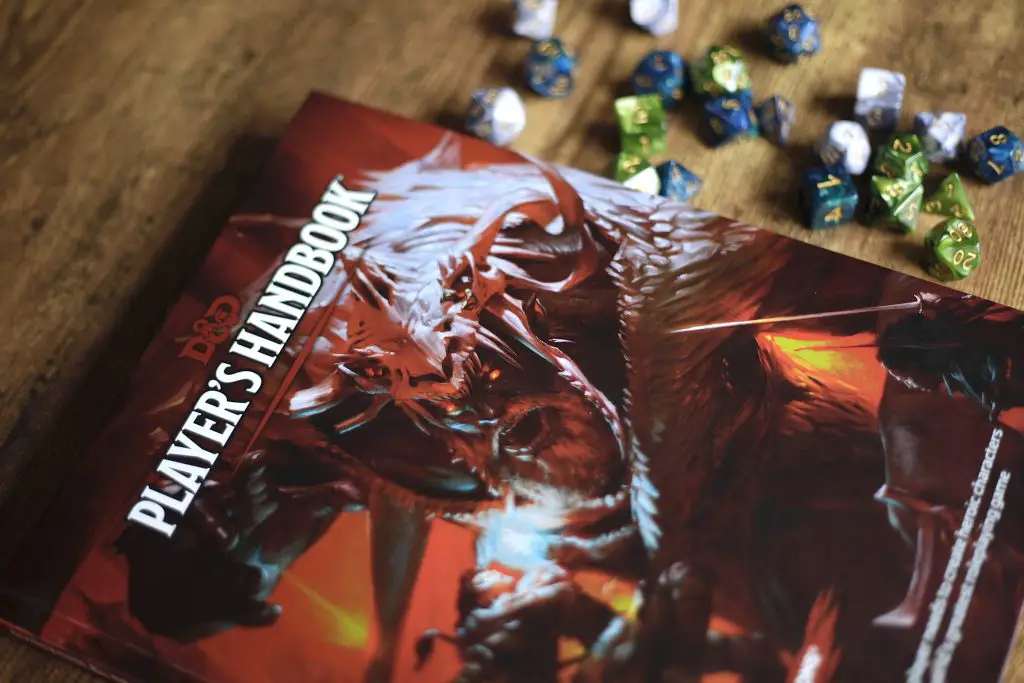
If you are running a game other than an official set, then you will also need a Monster Manual. I also find the Dungeon Master screen unbelievably helpful. A lot of small details that come up frequently are on the inside.
This might be surprising to hear, but if you’re a brand new DM, I don’t personally believe you need the Dungeon Master’s Guide. Sure, it can be helpful, but for the most part, it contains information about building a campaign. If you’re playing a pre-made one, you won’t need that yet.
I would also argue that you don’t need maps and miniatures. DMs use maps and miniatures during combat to help players visualize the space. Plus, some maps look super cool. At the same time, preparing multiple maps and purchasing the “right” miniatures can get expensive. This is an unnecessary barrier for a new DM.
If you would like to use them, though, instead of theater of the mind, you can do it affordably. This set of battle grid maps comes with most terrains you could want along with dry-erase markers. Or, if you want to make it really affordable, print out a few battle grids. Then, stick them in screen protectors from the dollar store. You can also print out more customized maps this way. As for miniatures, you can use pretty much anything: dice, Legos, paper cutouts, whatever. I’ve even used Play-Doh. Players can also be responsible for their own miniatures.
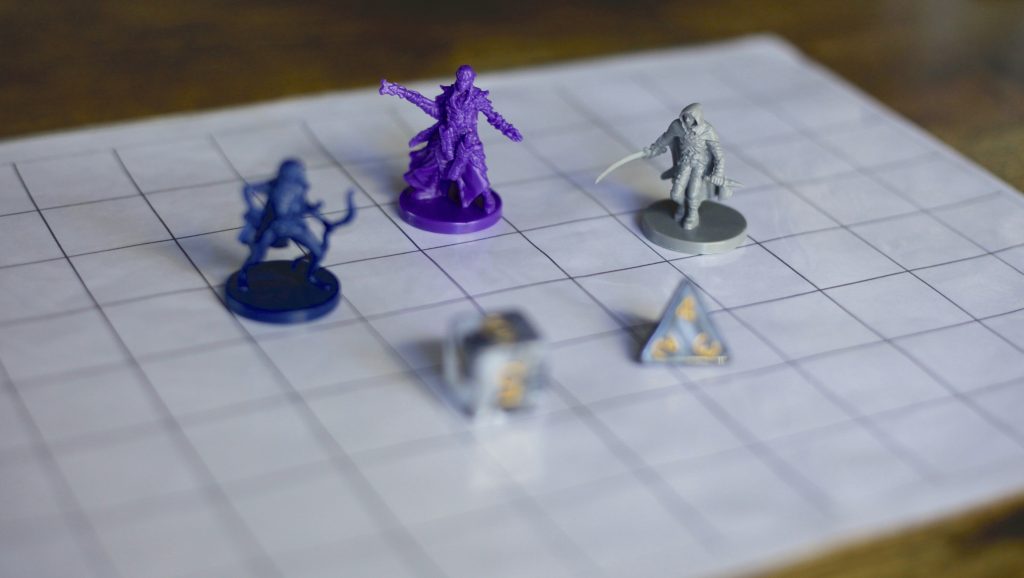
Preparing Each Session
Every Dungeon Master prepares their sessions in different ways as there’s no right way to prepare. Whatever way you choose to prepare, though, make sure to ask yourself this one question before going to your session.
Do I feel comfortable running this game today?
That doesn’t mean that you have to have every section of the module memorized or that you need to spend tons of hours reading it and taking notes. It does mean that you’ll want to have some sense of what your players might do and what will happen when your players do it.
Some simple ways to prepare for a game include bookmarking the section of the module you are in. Then, take note of which monsters are likely to appear and where you can find their stats. Also, review your notes on what the players did last game.
Along those lines, I highly recommend taking basic notes during or after each session. Simply note what the players did and where they are now. This will also help you award the correct experience points.
Bonus: Set the Mood
To really give your players the full D&D experience, you can add a few extra touches to immerse them in your world.
First, get a portable speaker and queue up some ambiance music or sounds. I use Spotify where I can find lots of pre-made D&D lists for battle or general ambiance. Sometimes I’ll simply pull up weather sounds if it’s called for in the game. For example, when playing the Starter Set, I would pull up wave sounds and (attempt to) make them louder or quieter depending on what part of Wave Echo Cave the players explored.
Second, you can use an unexpected sense: smell. The smell of some thematic candles can go a long way. Are the characters sitting beside a fire before taking a long rest? Light up this campfire candle. Maybe they’re fighting a terrible dragon. I have no idea what dragon’s blood smells like, but this dragon’s blood candle will make you feel like you’re on the battleground.
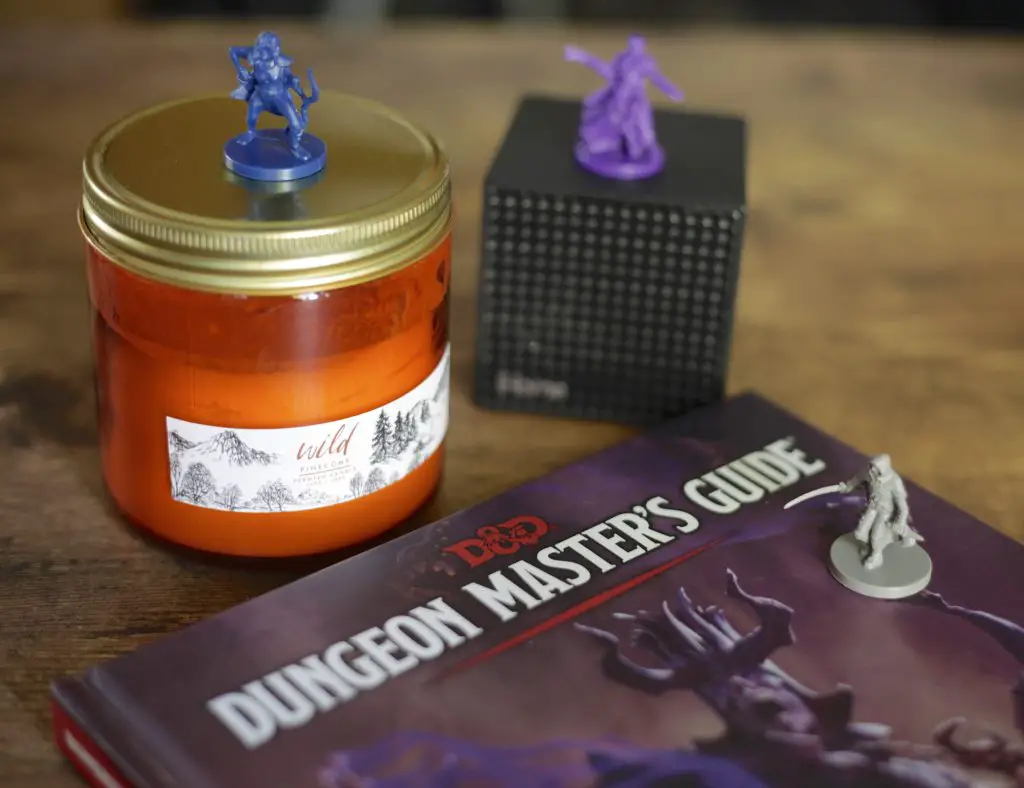
Finally, go for some tavern-themed game snacks. The Geeky Hostess has a great post on creating a D&D-style tavern menu. Breads, meats, and cheese are all excellent choices for a D&D menu. Don’t forget your ale, too. Many D&D games allow you to enjoy a good ale. You and your players should be able to as well! Your players can even “order” the items in-game and then eat them in real life!
These little touches don’t require a lot of extra work, but your players will really appreciate them. They’ll bring you all deeper into the world. Your players can also contribute more to creating the game by adding these elements themselves. Maybe one player brings food while another brings candles. Then everyone wins.
Can I Be a Dungeon Master If I’ve Never Played?
This is a common question among new players and Dungeon Masters alike. A lot of experienced players debate whether or not you can be a good DM if you’ve never experienced the game as a player.
Personally, I believe that you can absolutely DM if you’ve never played… but it helps to have played.
Think of it this way: everyone has to start somewhere. And with the different kits out there, it’s really not necessary to know everything beforehand. There are also other ways to learn about the game besides playing. You can watch live streams or listen to D&D podcasts, thoroughly read the handbook, or watch live games.
With that said, it’s definitely nice to have some personal experience as a player. Even having one or two one-shots under your belt can help define some of the key terms. If you want to play a game before you run one, you can learn how to find a game here.
If you’re running your first Dungeons and Dragons game as a new Dungeon Master, you are in for a treat. It’s rewarding to flesh out the world for your players and to see them have fun and enjoy new experiences. Remember, though, that it’s important for you to enjoy the game, too! One of the best signs that you’re running a good D&D game is whether or not you’re having fun. If you as the DM are having fun, then your players probably are, too.
Hi there! I’m Kristen. I’m a game writer, a Dungeon Master, and like you, I love tabletop games. Visit our About page to learn more about me.
I wrote this Cats and Dice article to help you enjoy gaming even more. Did it help? If so, our kitties (and our site) would be grateful for a little gift through Ko-Fi.


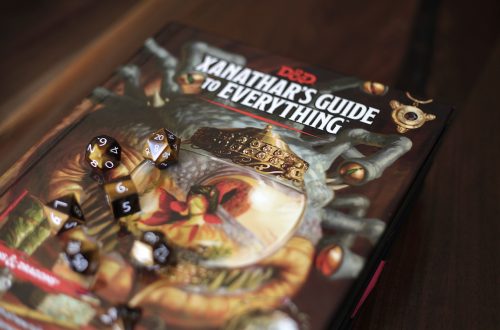
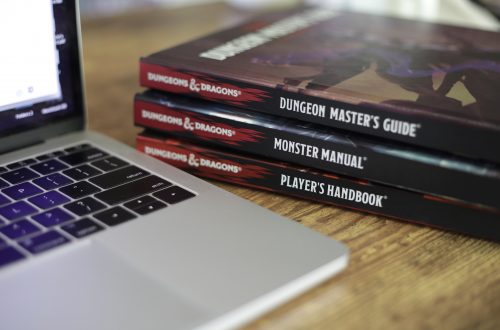
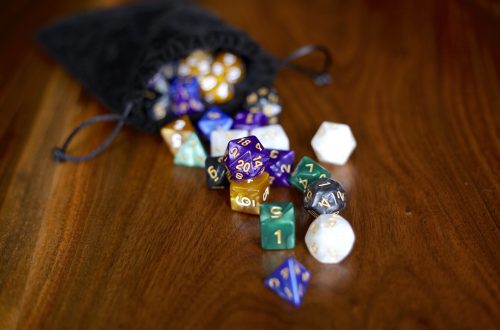
3 Comments
Viktor
Thank you for this really helpful article and for helping break the ice… just what I was looking for!!
Viktor
Oh… and of course HAPPY NEW YEAR
Mark
Hi Kristen, as a new D&D DM I have found your articles to be unbelievably helpful and written in a very accessible way, and clarifying rules quickly that I’ve struggled to understand. Thank you!